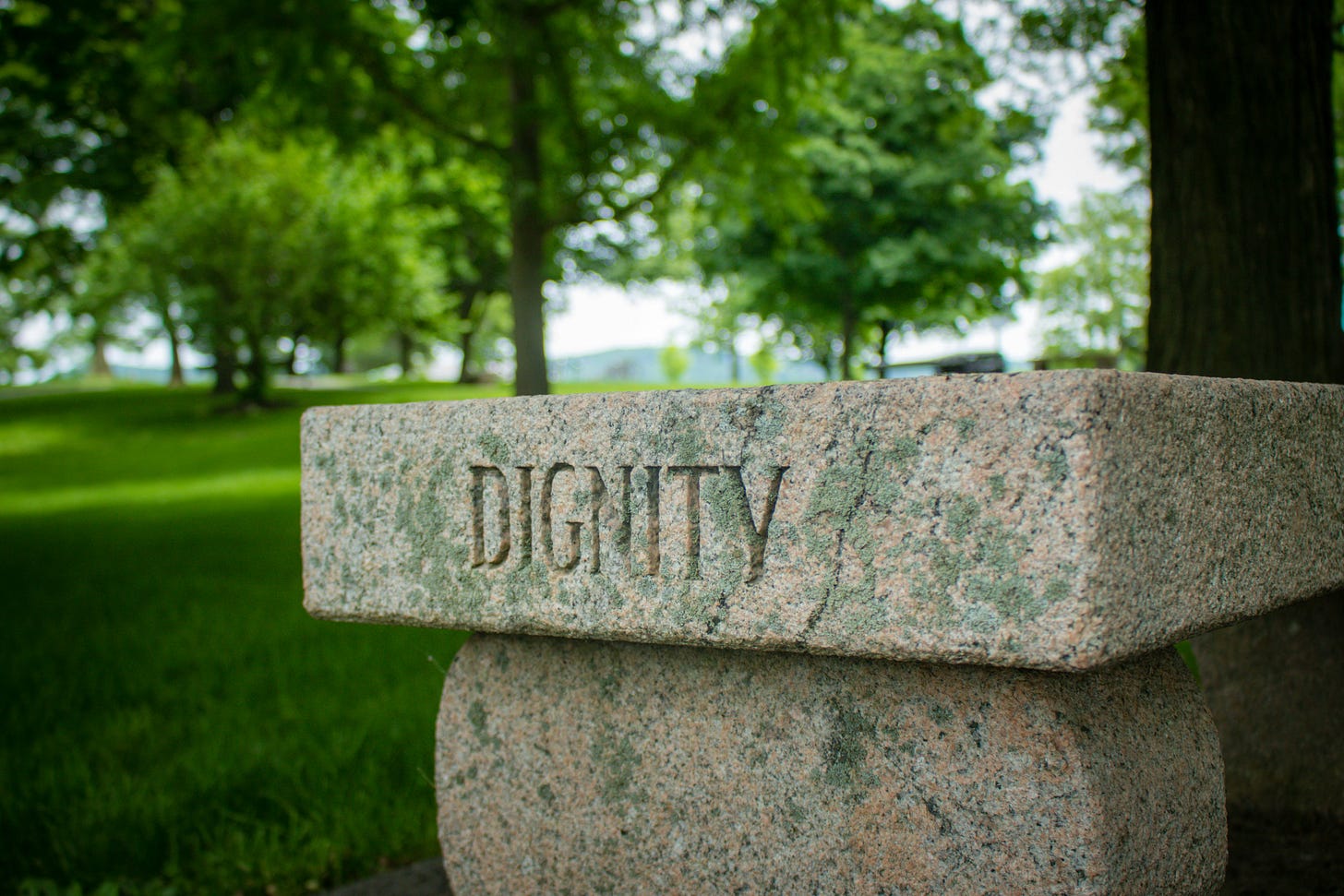In This Edition:
Dignity: A Moral Quest
Two New Articles on Dignity: Mere Orthodoxy & Christianity Today
Current Series: City Lights—Bearing Witness to a Culture in Crisis
Subscribe!
Dignity: A Moral Quest
Photo by Dave Lowe on Unsplash
“So God created mankind in his own image,
in the image of God he created them;
male and female he created them.”
(Genesis 1:27 NIV).
I am interested in the subject of human dignity—why people matter, what gives us worth, and how such value affects how we treat one another. It began as an apologetic interest which turned into an academic passion; now, it is a key part of my life’s work. For example, I recently contributed articles on dignity for Christianity Today, Mere Orthodoxy, and the Gospel Coalition. But here, I would like to explain how my interest in this subject developed, and why you should find it as interesting as I do.
Allow me to set the stage.
In 1976, Tom Warren (who held a PhD in philosophy from Vanderbilt and taught at what is now Harding School of Theology) debated Antony Flew, one of the premier atheists of his day. It would be 3 years before I graced the world with my presence, but even as a teenager I remember reading that debate and being blown away by the force of Warren’s moral argument for the existence of God.
Before the debate began, Warren asked Flew to record his answer to three questions, posed this way:
Question #1: “Is there objective moral right and wrong that transcends any given society, any time, and any space?” Being a good atheist with no illusions of any transcendent moral lawgiver, Flew answered “no.”
Question #2: “When the Nazis tortured little children by putting them in boxcars coated with quicklime, so they died agonizingly slow…was that wrong?” Being a sincere and self-respecting man, Flew answered “yes, that was wrong.”
Question #3: “What law did they violate?” Certainly not German law—that was simply to obey the Fuhrer. It is pointless to appeal to English or American law, since Germans aren’t bound by that. And, before 1948, there simply was no United Nations with codified and ratified laws binding and adjudicating sanctions for actions like those of the Nazis. Backed into a corner, Flew checked the box labeled “other” and wrote “International Law, see Nuremberg.”
With deep irony, Warren then quoted Justice Robert Jackson, the lead prosecuting attorney at Nuremberg, who summarized his case against the Nazis by appealing to that “higher law that transcends the provincial (place) and the transient (time)” – namely, an objective moral right and wrong that is not created by human societies, but to which all human societies are bound.
But a moral law requires a moral law giver, as C. S. Lewis so ably showed in the first book of his magnificent work Mere Christianity. After reading those two books (Lewis’s Mere Christianity and the Warren-Flew Debate), I was hooked. I wanted to defend the existence of God and show how and why God matters to every area of life.
In the fall of 2010, I had the good fortune to attend the London School of Economics and Political Science where I earned a master’s degree in philosophy & public policy from the department of philosophy, logic, and scientific method. A faculty full of atheists (who were wonderful people, I might add), the philosophy department was intentionally geared toward applied philosophical ethics in the political sphere. So I began to read Aristotle and Mill, Hume and Kant, Adam Smith and John Locke – assessing their moral philosophies, and debating how their contributions have shaped, helped, or hurt western political perspectives. The emphasis in my department at LSE was on the moral and philosophical foundations of all things political.
I couldn’t help but notice that we never quite dug far enough. Dr. Greene using his fMRI imaging claims he can tell what moral decisions you will make before you make them, since he can distinguish patterns in how you answer common trolley problems. But as interesting as that may seem, at best all Dr. Greene can tell you is what you think you should do. His machine can’t tell you what you really ought to do. No machine can. And without a moral lawgiver, nobody’s opinion or line of reasoning can really carry the day in all our efforts to bring everyone together on the truth of moral reasoning.
I wanted to show this. So I chose as my master’s thesis a fun and simple project: I wanted to challenge some moral value that we in the Western world hold sacrosanct, without appealing to any moral law code or moral lawgiver—and show that no matter how long the value has ruled our civilization, without a transcendent principle of truth, the emperor has no clothes. So I chose human equality.
Peter Singer is a brilliant Australian moral philosopher who held dual prestigious posts in Princeton and Melbourne. He is infamous for making the claim that a 2 year old infant is less cognizant of himself and his surroundings, less able to contribute to society, and thus less of a ‘person’ than a 3-year old chimpanzee who can express themselves through sign-language. The net result of this consistent utilitarian perspective is that if there was an infant and such an ape trapped in a burning building, you would have the moral obligation…to save the ape.
Singer joined with others to advocate “the Great Ape Project” which sought to bring these higher mammals into the “moral community of equals,” giving them rights that we afford human beings that are less aware and less productive. My thesis question—developed in the philosophy department—was a simple one: what property, or set of properties, applies to all humans and only humans, which has such moral value as to ascribe intrinsic or justified extrinsic ‘dignity’ and ‘equality’ (and thus rights to life, liberty, and all the rest)? In other words, what defines the moral value of human equality – that makes all humans equal, yet excludes all others?
With Singer, I couldn’t find one. But it was in my reading of another figure who buttressed and agreed with Singer that forever affected the future of my research. That was John Locke. Remove any reference to a transcendent principle of truth or a moral lawgiver like God, and there just isn’t any good justifiable reason to argue against racism, ageism, and sexism, and yet still allow speciesism; no good reason to ascribe inherent dignity, worth, and rights to all humans in some special and unique way.
Notice I said Locke agrees with Singer without reference to something transcendent. That is interesting for two reasons. First, Locke’s name and his arguments for liberty and human equality are called upon by secular ethicists far and wide in their appeal to human rights; so whatever is necessary to Locke’s argument is of real interest for anyone working in ethics, human rights issues, international law, etc. But second, it’s interesting because Locke’s arguments are so very theological. His case—in fact, the case for his entire moral philosophy and political theory – require not only for God to exist, but for (1) a specific kind of God, and (2) a theology of Creation to define and defend his natural law, and (3) appeal to teachings that are found in Scripture. In short, Locke actually offers a political theology, and his conclusions—borrowed by secularists the world-over—can’t be separated from their theological roots.
Finding more than could be discussed in a master’s program, I researched this theological aspect of Locke’s political theory in my PhD dissertation at Cambridge, later published by Bloomsbury as Finding Locke’s God: The Theological Basis of John Locke’s Political Thought.
I have come to believe the secularists who deny the theological connection to claims of human dignity are doing themselves a disservice that hampers rather than aids their ultimate cause. A theological argument works much better than many alternatives to reach very similar conclusions regarding ethical function in the world.
In a sense, my work is a political argument for God’s existence: if you believe in such western political values as liberty, equality, dignity, and toleration, you ought to believe in God. And, what is more, an explicitly Christian approach to the nature of God and his dealings with the world offers a robust explanation that accords with our intuition, and consequently lies at the heart of western claims of human dignity.
By God’s providence, I now work as the new director for the David E. Smith Healthcare Ethics & Human Dignity Initiative at Harding University. In this role, I am able to continue my writing, research, and teaching in this fundamental area of interest. Whether in an ethics classroom, an academic volume, or a popular journal, my work will inspire others to see value in all people, and to recognize the theological anchor that makes such valuation possible.
Three New Articles on Dignity
Nathan Guy, “Some of Christianity’s Biggest Skeptics Are Becoming Vocal Converts,” Christianity Today (Online) Sep 13, 2024. [“The New Christian Era,” Christianity Today Sep/Oct 2024].
Nathan Guy, “The Search for Human Dignity,” Mere Orthodoxy (Online) Sep 12, 2024.
Nathan Guy, “Jesus Made Your Moral World (Even If You’re An Atheist),” The Gospel Coalition March 24, 2024.
New Sermon Series: “City Lights”
Paul’s powerful and challenging First Letter to the Corinthians addresses ancient problems that feel remarkably contemporary. It is easy to read the book as a bit of internal dialogue, but Paul’s end-goal is for the church to shine as a light in the midst of a dark world. In this series, examine each chapter of this remarkable book, read through the prism of Paul’s “7 ones” that serve as his theological foundation stones. Then, we will ask how shaping our church culture around these 7 ones can help our witness in the world, providing an alternative narrative to the voices clamoring for our attention.
The series began August 18 and will continue through the rest of the year.
Lesson 1: 7 Lenses for Christians in Corinth (video / podcast)
Lesson 2: One Body: Called To Unity (1 Cor 1:10) (video / podcast)
Lesson 3: One Baptism: Our Shared Common Bond (1 Cor 1:13) (video / podcast)
Lesson 4: One Spirit: Power & Wisdom (1 Cor 2:4-5) (video / podcast)
Lesson 5: One Faith: Our Way of Life in Christ (1 Cor 4:15-17) (watch live Sunday at 9 AM)
Stream our lessons Sundays at 9 AM (CST) on facebook or YouTube or on our website. If you are in the middle Arkansas area, we would love to have you join us in person. I’ll save a seat for you.
Subscribe to Life on the West Side
My name is Nathan Guy. In my day job, I am thrilled to serve full-time as the preaching minister for the West Side Church of Christ in Searcy, Arkansas. I also work part-time for Harding University as associate professor of philosophy, theology, and ethics and as the director of the David E. Smith Healthcare Ethics and Human Dignity Initiative. I joyfully adjunct courses for the School for Professional Studies at St. Louis University and enthusiastically serve as chairman of the board for the Center for Christian Studies. I am happily married to Katie and am the proud father of Grace (who is 3) and Henry (who is wee). You can find more resources on my website over at nathanguy.com. You can follow me on social media: Facebook, Instagram, Twitter (X), Threads, and YouTube.





